
The Center for Coordination of Agricultural Research and Development in Southern Africa (CCARDESA) actively participated in the Food, Agriculture, and Natural Resources Policy Analysis Network (FANRPAN) Regional Multi-Stakeholder Policy Dialogue held from 6th to 9th August 2024 at the Bingu International Convention Centre (BICC) in Lilongwe, Malawi. The dialogue centered on the theme, "Policy Pathways Towards Transforming Africa’s Agriculture and Food Systems."
CCARDESA Executive Director Professor Cliff Dlamini highlighted critical shortcomings in current policy-making processes. He emphasized, "Policies have typically started with a problem, but what we need is for these problems to be discussed by all stakeholders." This collaborative approach ensures that solutions are comprehensive and inclusive. Prof. Dlamini pointed out the substantial gap between scientists and policymakers within the Science-Policy Interface, stating, "The Science-Policy Interface reveals a significant gap between scientists and policymakers, hindering the actualization of effective policies." He underscored the urgency for policy-driven research to transform agriculture, stressing, "there is a pressing need for policy-driven research that will revolutionize agriculture."
 13 Aug 2024
13 Aug 2024
Professor Dlamini, in addition to his other insights, stressed the critical need for a more integrated and collaborative approach to policy development. He called for a deeper understanding of the political economy surrounding food and climate change to develop robust strategies. He elaborated on the concept of scaling, which requires a multifaceted approach: "Scaling requires a multifaceted approach: scaling out to reach large numbers, scaling up to influence policy, and scaling deep to affect cultures and communities." These insights underscore the critical need for a more integrated and collaborative approach in policy development to effectively address pressing global issues.
In his reflections, CCARDESA Board Chair Prof. Aime Lala Razafinjara emphasized the importance of adopting good agricultural practices for sustainable food systems and urged the enhancement of soil health to increase food yields.
At the same event, Mr. Bonani Nyhodo from the National Agricultural Marketing Council and FANRPAN South Africa Node shared a critical perspective: "We must be cautious of the invisible hand—the hidden agendas at play. It’s essential to establish a platform to address and discuss policy. One possible outcome of these hidden influences could be the recommendation for further study, but this alone may not solve our challenges. He further elaborated that we are progressing with our food systems. Yes, but it requires courage and focus. Let us not become rigid like stones but remain adaptable and resilient, even in adversity."
Dr. Gbegbelegbe emphasized the critical importance of food security, stating, "If only 5% of the population is food insecure, then food security is guaranteed. However, events like droughts could severely impact maize production, which is a staple in many regions."
He also pointed out the gaps in current strategies, noting, "There is insufficient documentation on how we can improve the management of humanitarian aid in the future." He further advocated for increased investment in Agricultural Research and Development (AR&D) to develop improved varieties of key crops like millet, maize, legumes, and sorghum to address these challenges. Additionally, he suggested exploring diet diversification as a potential solution.
Dr. Ackim Mwape from the New Zealand Agricultural Greenhouse Gas Research Centre raised critical questions about policy development strategies in Africa, asking, "How is our policy development strategy structured? Who decides these policies, and how are power imbalances addressed?" He stressed the need for evidence-based strategies, warning that "without strong evidence and data to support our policies, we are unlikely to succeed." Dr. Mwape highlighted a successful intervention where research was conducted across multiple countries using standardized protocols, leading to replicable reports. He underscored the necessity of collaboration, stating, "We need more collaboration; it can't happen in isolation. And we must be prepared to invest in these partnerships internally."
Prof. Norman Maiwashe from the Agricultural Research Council (ARC) focused on the need for breed improvement in agriculture, noting, "We need to revisit our strategies to ensure that we are leveraging nature's assistance in our breeding programs."
Dr. Andrew Jamali from the National Planning Commission – Malawi posed vital questions regarding the balance between climate mitigation and adaptation, particularly in Malawi, where these issues are becoming increasingly critical.
Dr. Lavel Moonga, University of Zambia, shared insights from a community-focused research initiative in Zambia. "We selected a community and conducted research that was directly relevant to their needs, ensuring extensive stakeholder engagement throughout the process," he explained. He emphasized the importance of having a multi-disciplinary and inclusive research team to address the complex challenges faced by the community.
In closing the Regional Policy Dialogue, Dr. Tshilidzi Madzivhandila, FANRPAN Chief Executive Officer, expressed his gratitude to all stakeholders for their participation. Dr. Madzivhandila hailed the dialogue as a success, drawing over 300 stakeholders from across the continent, including representatives from academia, research institutions, NGOs, the private sector, health, and policymakers.
The CCARDESA delegation included Board Chair Prof. Aime Lala Razafinjara, Finance Manager Mr. Simon Mukuze, Acting Head of Human Resources Mrs. Lerang Maruping, and ICKM Officer Mrs. Bridget Kakuwa-Kasongamulilo also paid a courtesy call on the Minister of Agriculture, Hon. Sam Kawale. The mission was sponsored by the CAADP-XP4 Programme, funded by the European Union, and financed through the International Fund for Agricultural Development (IFAD).






